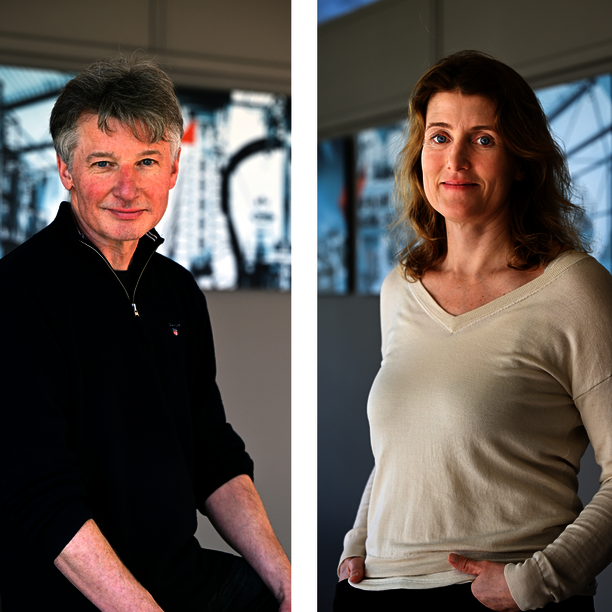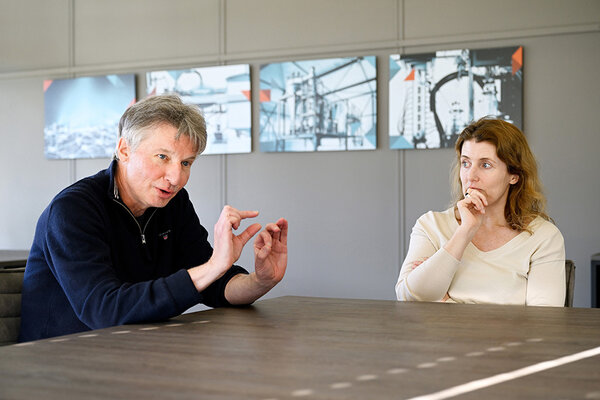EIRES acts as a unifying umbrella with over 150 researchers working on energy technology at TU/e. Although the common goal is clear, namely, to accelerate the energy transition, there is ample room for debate when it comes to exactly how to achieve that. Guided by EIRES managing director Mark Boneschanscher, Floor Alkemade, Professor of Economics and Governance of Technological Innovation, and David Smeulders, Professor of Energy Technology, discuss their personal views on what has to be done and by whom.
First off, is the energy transition primarily a technological or a socioeconomic challenge?
David Smeulders (DS): ‘Technology certainly is important, but you can’t have one without the other.’
Floor Alkemade (FA): ‘During the final months of 2022, we saw a huge reduction in the use of natural gas. Partly due to the rise in costs, but also as a result of conscious behavior. I am convinced that behavioral change holds great potential, and that we should tap into that. We are facing a tight deadline when it comes to climate change. So we cannot afford to wait for the best or most elegant technological solutions, but we simply have to go for what is available and possible now.’
DS: ‘Do not forget that a large share of the reduction in gas usage arose from partly shutting down industry. My biggest fear is that greening the economy comes down to impoverishment.’
FA: ‘I do understand that fear of causing an economic downturn. However, it is time to start reevaluating what types of industry we actually want and need to house as a country. Should we try to keep energy-intensive industry here or will these industries move to countries where renewable energy is available in abundance?’
DS: ‘The last thing we should do is to scare away companies. We desperately need investment capacity to realize our climate ambitions. It is not up to politics to decide whether or not companies like Tata Steel, zinc factories or aluminum production facilities have a future in our country. It is up to the companies themselves. They should be welcome as long as they see opportunities to make a profit here. However, this should not prevent us from looking at things like carbon emission rights in a European context. Emission does not stop at the national borders.’
FA: ‘To me, the discussion should focus on whether or not we should actively support companies to do things that are not profitable here with the current energy prices. I do not plea for an active policy of chasing them away, but in my opinion, energy costs should reflect the environmental costs, and subsidies and support should only go to activities that accelerate the energy transition.’
DS: ‘I am against taxing the use of energy. It is the emissions we should make more expensive. The world as a whole needs to increase its energy consumption to relieve poverty. But we have to find ways to do so without increasing the amount of CO2 in the air. That is the challenge.’
FA: ‘To me, it is a no-brainer that we should not facilitate polluting activities in our country. The question we should ask ourselves is: What industries do we want here, and how can we attract and retain those?’
DS: ‘In such a debate, emotions tend to take over. Take the NAM. We have come to a point where people who work there are held personally accountable for the earthquakes in Groningen. And Shell employees are all considered to be environmental criminals.’
Should we as a university collaborate with Shell, and if so, under what conditions?
FA: ‘Recently, I took part in a PhD committee in Norway. The PhD researcher concluded that there is a large overlap in the knowledge base when it comes to fossil fuels and offshore wind. We can already see that finding appropriately qualified personnel will be the bottleneck for the energy transition. It doesn’t help to frame the people who are currently working on fossils as the bad guys. We simply need their knowledge to be able to make the transition.’
DS: ‘For once, I fully agree. To me, the transition should be an inclusive one. That means we also need to invite the fossil fuel companies. Think about it this way: if they only invest a small percentage of their budgets in the transition, that still is a huge amount of money.’
EIRES’ goal is to accelerate the energy transition. How should we do this?
DS: ‘Listen to the region. Brainport is known for its short lines of communication between academia and industry. Ask industry how they see our role. And negotiate for them to fund a number of PhD researchers dedicated to fundamental energy research.’
FA: ‘We should help our stakeholders unlock academic knowledge on the subject. In my group, we collaborate a lot with public parties, such as local governments and network operators. They have trouble translating the available scientific knowledge to their daily practice.’
DS: ‘A worrying development is that domain-specific expertise is becoming rare among civil servants. Most officials are generalists, not specialists. We need a National Planning Agency for Energy that can act as a natural point of contact for universities. We already see this collaborative planning when it comes to the hydrogen agenda, for example with GroenvermogenNL.’
What is your hope for the future?
DS: ‘We should focus on socio-techno-economic solutions. And despite all of the challenges I see, I am positive we will make the energy transition happen.’
FA: ‘I am also optimistic this can be solved. However, I am worried about the pace: will we be fast enough? We are continuously lagging behind on where we should be. There is urgency, there are agreements, there is technology. And still, we do not act.’
DS: ‘In this country, it is hard to get things done. We are way too hooked up on procedures.’
FA: ‘And we do not look ahead. Developments like the current shortages on the labor market are things we could have seen coming ages ago. What we need are adaptive policies. Make a plan: when we reach this amount of electric cars, we will scale up the infrastructure this way.’
DS: ‘In 2008, the Netherlands Scientific Council for Government Policy warned that we needed to invest in our electricity grids in order to guarantee grid stability with an increasing supply of renewables. And in 2013, Minister of Economic Affairs Henk Kamp repeated this message when he urged the Authority for Consumers & Markets not to steer on costs, but to invest in the grid. The greatest threat for the energy transition is the fear of not doing the right thing, and as a result of that fear, deciding to do nothing at all.’
FA: ‘Whatever we can do now, we should do. Even if it is not the best or the cheapest solution. Every step in the right way is a step we should take. And not tomorrow, but today.’
David Smeulders and Floor Alkemade - Photo credits | Bart van Overbeeke Fotografie

